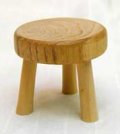Stop Baptist Predators
November 19, 2008
http://stopbaptistpredators.blogspot.com/2008/11/three-legged-stool.html
Clergy abuse survivors in other major faith groups have three possible ways for exposing their perpetrators and warning others: (1) criminal prosecution, (2) civil litigation, and (3) ecclesiastical process.
Think of it as a 3-legged stool. It's not a very pretty stool; it's not a piece of Shaker craftsmanship. But for other faith groups, the stool at least has three legs.
For Baptists, it's a stool with only about one and a half legs. In effect, it's not any stool at all, and that's why kids in Baptist churches are at greater risk.
 |
The first leg: criminal prosecution. It's good if you can get it, but for most, it's not possible. The very nature of the psychological damage usually renders a child sex abuse victim incapable of speaking about it until many years later when it's too late for criminal prosecution. Nationwide, district attorneys recognize this basic reality that most child molesters escape criminal prosecution because of short statutes of limitation. So, while criminal prosecution is an important leg, it can't possibly hold up the stool.
The second leg: civil litigation. It won't put the offender in jail, but it can at least bring the offender's deeds into the light of day and help protect others. Civil litigation gives reporters something they can write about, and so it can bring information about clergy perpetrators to people in the community.
Clergy abuse lawsuits face similar time limitation hurdles as criminal cases, but depending on the state, there is sometimes a measure of flexibility for a civil lawsuit that isn't available for a criminal case.
However, lawyers considering Baptist abuse cases face even more hurdles than just the time-lag problem. In Baptist cases, lawyers also struggle with finding a line of responsibility because, in the autonomous system of Baptist churches, the buck stops nowhere. By contrast, with Catholic cases, there's a clear line of responsibility. Penn State professor Philip Jenkins has observed that the "relative ease of litigation against Catholic dioceses" helps to create the public misperception that clergy abuse is "a Catholic problem," when in fact, it's just as big a problem for other faith groups. (Philip Jenkins, Pedophiles & Priests, at p. 51 (Oxford U. Press 1996).
Baptist cases can face still more hurdles that lessen the likelihood of litigation and insulate the denomination from court scrutiny. While most Catholic dioceses endure virtually forever, Baptist churches have no trouble in dissolving, reorganizing and renaming themselves. This too can make it more difficult to pursue civil litigation in Baptist clergy abuse cases. And without litigation, reporters will be less likely to write about it, and people in the community will have less chance of finding out about Baptist clergy child molesters.
So, for Baptist clergy abuse survivors, the civil litigation leg of the stool is really only about half a leg as compared to other faith groups. Because this leg is so much smaller for Baptists, you won't read about as many Baptist cases in the newspapers, and Baptist clergy child molesters will stay more easily hidden.
The third leg: ecclesiastical process. In most other major faith groups, some sort of ecclesiastical process provides the third leg of support for the stool. Other faith groups provide a systematic process for assessing clergy sex abuse reports. They don't wait for a minister to be criminally convicted, because they know that at least 90 percent of clergy child molesters will slip through the cracks with that approach. So instead, leaders within the faith group take on the responsibility for deciding whether abuse allegations are substantial enough that a man should not be allowed to continue in a position of high trust as a minister.
Decisions made by ecclesiastical processes – or church trials as some call them – are also something that reporters can write about. So they provide still another way of getting information about clergy sex abusers into the light of day and of warning people in the community. Recent news accounts provide ready examples of how church trials brought information to the public about credibly-accused Catholic, Presbyterian and Episcopalian clergy. In fact, for these faith groups and others, this is the strongest of the stool's three legs, because it has been the means by which the most credibly-accused clergy child molesters have been removed from ministry.
But this possibility doesn't even exist for Baptists. These sorts of stories never see the light of day for them because there is no ecclesiastical review process for the 101,000 Southern Baptist clergy in this country. There is no third leg.
Unlike other major faith groups, Southern Baptists have no systematic process for objectively and professionally assessing clergy sex abuse reports. There is no committee, no panel, no review board. There is no safe place to which clergy abuse survivors can report their perpetrators. There is no one in leadership who will take on the responsibility of assessing clergy abuse reports or of providing information to people in the pews.
So... imagine what happens to a 3-legged stool if you take away one and half legs. Southern Baptists simply don't have any stool of support for protecting kids in Baptist churches.
Any original material on these pages is copyright © BishopAccountability.org 2004. Reproduce freely with attribution.